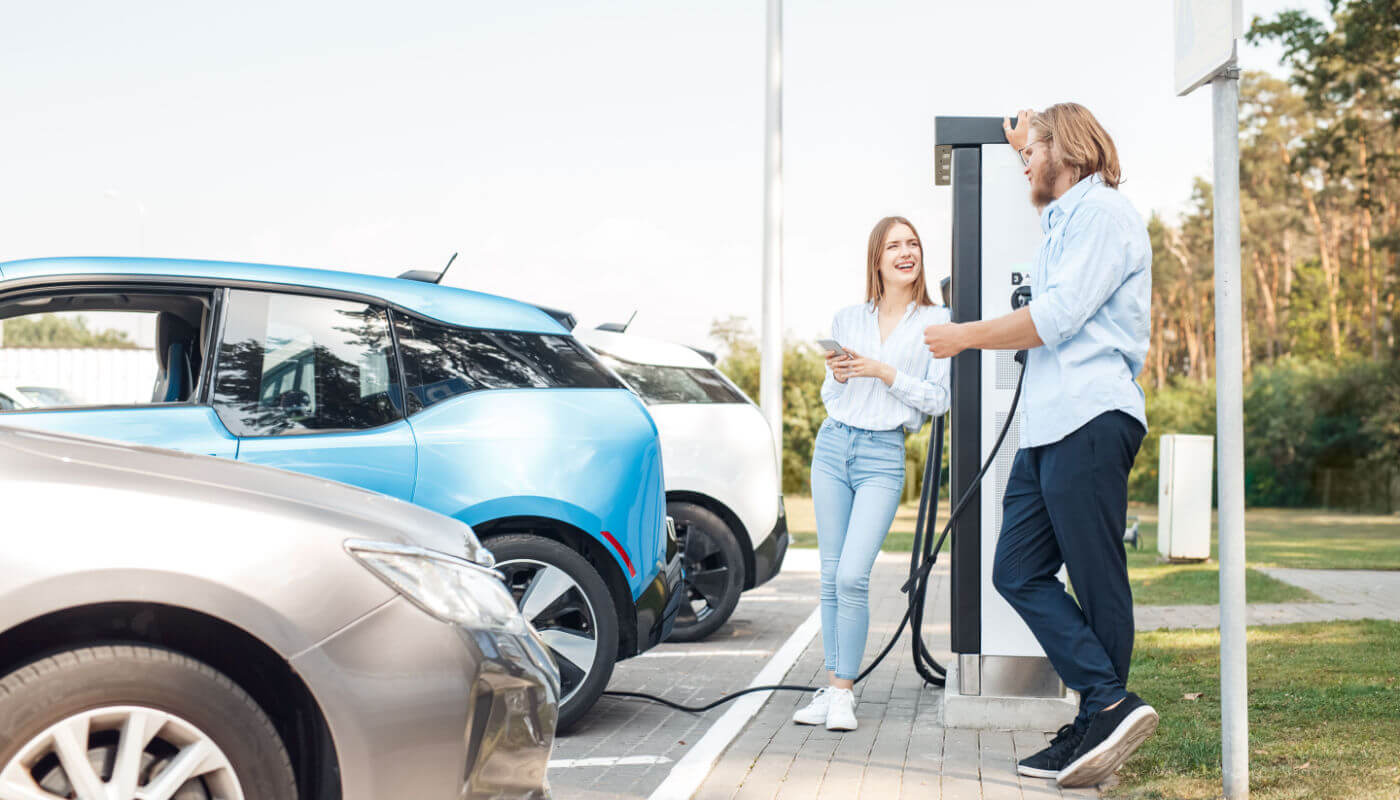What Dealers Can Expect From the Used Car Market in the Second Half of 2022
Earlier this year, we saw extremely high levels of demand for used cars, continued inventory shortages, and rising prices. Will this trend continue...

Electric vehicles (EVs) are energy efficient, quieter, contribute to a better environment, and require less maintenance than gas-powered vehicles. EVs may have a higher up-front price tag, but the long-term rewards can significantly outweigh the initial cost. With gas prices still fluctuating and gas-powered new and used cars at record-high prices, why are American consumers still hesitant to adopt EVs? What steps can dealers take to ensure customers are educated about the newest in the EV market?
According to Yahoo Finance, only two in five Americans are "somewhat" likely to buy an electric vehicle as their next car. As of 2023, a pool from The Associated Press-NORC Center for Public Affairs Research and Energy Policy Institute reported that 8% of U.S adults say their household owns or leases an electric vehicle, and another 8% currently own a plug-in hybrid. Even with tax credits implemented by the Biden administration for up to $7,500
for a new EV, Americans are not yet making the switch.
Higher up-front costs to purchasing an EV is a concern cited by many consumers.
Even though new and used car prices are at a historic high; EVs cost an average of $61,488, significantly more than the average cost of a new or used gas-powered vehicle. This cost disparity can deter some consumers from considering EVs, especially those with budget constraints or who prioritize immediate affordability.
Another obstacle from consumers is range anxiety, concerns about the limited driving range of EVs compared to traditional vehicles. Fifty-eight percent of Americans surveyed have range anxiety and 49% worry about the availability of charging stations in their area. Consumers may need more battery power before reaching their destination, especially on long trips or regions with limited charging infrastructure. The availability and accessibility of charging stations play a significant role in EV adoption. The charging infrastructure may need implementation or improvement in certain parts of the country, making it inconvenient for potential EV owners depending on where they live or travel.
Adjacent to this is charging time; some potential customers might believe charging an EV will take longer than refueling a conventional vehicle with gasoline. This could be inconvenient for individuals accustomed to quick refueling at gas stations.
In addition to a high up-front cost, potential EV owners worry about the higher cost of repairing or replacing a battery. A new electric motor could cost as much as $5,000 - $9,000.
Many Americans may still need to learn about the benefits and capabilities of EVs. Misconceptions about EVs, such as concerns about battery life, charging times, or performance, can contribute to the hesitancy to adopt this technology. It's crucial for EV dealers to educate customers on common misconceptions.
Dealers can start by addressing a customer's concerns regarding EVs, some of which are listed above.
Yes, EVs could mean a higher purchase price, but when considering gas prices, limited maintenance, and government tax incentives, the cost per mile is usually less than driving a gas-powered car. Replacement batteries are undoubtedly expensive, but most EVs have a 100,000-mile battery warranty, much higher than the three-year, 36,000-mile warranty on most new gas-powered vehicles.
Most EVs can go for 250-300 miles on one charge, which should help ease range anxiety for some consumers. If charging while on a long trip is a concern, 250 miles can equal around three to four hours of driving. There are 50,000 EV charging stations nationwide, and 500,000 more are pledged to be built by 2030 with President Biden's infrastructure bill.
In a 2022 study, J.D Power conducted a second-annual consumer satisfaction survey on electric vehicles. Most of the 8,000 EV owners surveyed found the switch to electric cars "highly satisfactory," and most drivers indicated they "would not go back to gasoline."
As we witness the transformative era of electric vehicles, it's essential to delve into the broader implications, environmental impacts, and the future trends expected to shape the industry. By doing so, we can create a comprehensive picture that goes beyond just cost and functionality.
Electric vehicles, at their core, aim to reduce the carbon footprint that the automotive industry has imprinted on our planet. Gasoline-powered vehicles emit considerable amounts of greenhouse gases, primarily carbon dioxide. Over time, these emissions contribute to global climate change, acid rain, and smog. EVs significantly reduce these harmful emissions. They produce zero tailpipe emissions, which, in urban environments, can substantially decrease air pollution.
Moreover, as renewable sources of energy (like wind, solar, and hydroelectric power) become more widespread, the environmental benefits of EVs will become even more pronounced.
The EV industry is also making strides in recycling, particularly concerning batteries. As the life of a battery comes to an end, its components, especially metals like lithium, can be repurposed, reducing the need for mining and further diminishing environmental impact.
Battery technology has seen rapid advancements over the past decade. Lithium-ion batteries, which are commonly used in EVs, have been at the forefront of this innovation. They're now able to store more energy, allowing EVs to travel longer distances on a single charge. Some luxury models are even reaching ranges of over 370 miles, bringing them on par with many gasoline vehicles.
The development of fast-charging stations can recharge EVs in as little as 20 minutes. Furthermore, innovations like solid-state batteries promise even faster charging times and longer lifespans in the future.
A smart grid is an electricity network that uses digital technology to enhance the reliability, efficiency, sustainability, and economics of electricity services. As EVs become more prevalent, their integration into the smart grid becomes increasingly relevant.
V2G systems allow for two-way communication between the EV and the electric grid. This means that EVs can both take electricity from the grid and send it back. Essentially, every EV has the potential to become a mini power station. During peak hours, when electricity demand is high, EVs can supply the grid with extra energy, stabilizing the network and potentially providing revenue for EV owners.
Smart charging solutions can determine the best times to charge your EV based on electricity rates, ensuring that you're always getting the most cost-effective charge. This not only saves EV owners money but also aids in grid stabilization by spreading out electricity demand.
As we focus on America, it's vital to understand EV adoption from a global viewpoint:
Countries like Norway and the Netherlands have been trailblazers in EV adoption, with governmental policies, extensive charging infrastructures, and public awareness campaigns. Norway, for instance, aims to end sales of gasoline and diesel vehicles by 2025.
China, the world's largest car market, is also becoming a hub for electric vehicles. With aggressive policies that favor electric over gasoline, coupled with considerable investments in infrastructure, China projects an EV-dominated future.
While we've addressed the immediate concerns of consumers, it's essential to recognize the broader challenges the industry faces:
While urban centers are rapidly expanding their charging infrastructure, rural areas are lagging. For EVs to become universally adopted, the charging network must be extensive, covering every nook and cranny of the country.
Despite the strides made, many potential consumers remain unaware of the full benefits of EVs or hold outdated perceptions of their capabilities. Continuous public awareness campaigns, educational programs, and hands-on experiences can change this narrative.
In wrapping up this comprehensive look at electric vehicles, it's evident that the automotive industry is on the brink of an electric revolution. But for this transformation to be wholly realized, a synergy of technological advancements, infrastructural developments, policy interventions, and public perceptions is vital.
Dealers, manufacturers, and stakeholders need to work hand-in-hand with consumers, addressing concerns and educating them. Meanwhile, tools like ZeroSum’s MarketAI can be indispensable assets in matching consumer intent with inventory, ensuring that the right vehicle reaches the right buyer at the right time.
In essence, the journey toward an electrified automotive future is filled with promise, potential, and challenges. But with concerted efforts, a clear vision, and unwavering commitment, a cleaner, greener, and more efficient future is well within our grasp.
One of the most important elements for selling more EVs is to target people who are in the market for an EV purchase. Using historical data along with real-time dealership inventory, MarketAI acts as the matchmaker between people who are most likely to buy a vehicle and the dealers that have that vehicle (or similar) in stock. With ZeroSum’s MarketAI, dealers can maximize their ad spend by quickly delivering hyper-targeted inventory-based ads directly to customers that are ready to buy. Targeting the right customers with the right vehicles will greatly increase dealership EV marketing efficiency.
In addition, MarketAI analyzes real-time inventory supply and consumer demand data to achieve maximum marketing efficiency and turn rates. A data-driven tool like MarketAI is essential to dealers who want to become a leading EV retailer. Electric vehicles are likely to keep growing in popularity, so there is no time like the present to make MarketAI part of your dealership’s marketing tool kit. Contact the ZeroSum team here to get started today.

Earlier this year, we saw extremely high levels of demand for used cars, continued inventory shortages, and rising prices. Will this trend continue...

Today's car shoppers overwhelmingly choose to research vehicles online before ever stepping foot on a dealership lot. So, a dealership's ad campaigns...

MarketAI Can Help Dealers Navigate the Evolving EV Marketplace